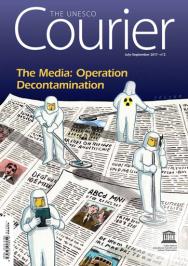مقال
الصحافة الإستقصائية : الكشف عن الحقيقة رغم كلّ الصّعاب

تمثّل الصحافة الإستقصائية إحدى ضمانات المسار الدّيمقراطي. لكن مستقبلها غير مؤكّد : بدون استقلالية مالية، لن تصمد طويلا. وفي تجربة ري بلطيقا - وهو مركز للصحافة الإستقصائية في لاتفيا - مثال يقتدى به.
سانيتا جيمبرغا
أشعر بالإنزعاج كّلما تم اعتبار الصحافة الإستقصائية بمثابة "المهمّة" أو "الموهبة". أنا أعتبرها، بكلّ بساطة، خيارا فرديا تولّده الضرورة، وتيسّره مجموعة من المهارات وشخصية متميّزة تتحلى بالمثابرة والتماسك في مواجهة المظالم أحيانا. وقد أوضحت زميلتي إنجي سبريزي ذات يوم أنها تمارس هذا العمل من أجل جدّتها التي ليست قادرة على مساءلة السلطات حول مواضيع معقدة !
لقد تم اختبار عزمنا أنا وسبريزي، في مواصلة مساءلة السلطات عندما تمّ بيع ديانا، وهي الصحيفة التي كنا نعمل فيها، من طرف ناشرها، بونيير (التكتل الإعلامي السويدي)، لأقليّة من المحليين ذوي النفوذ الذين كانوا قد حاولوا إسكات الصحيفة منذ سنوات عدّة. وقد حدث ذلك في خضم أزمة اقتصادية عميقة، وانهيار جمهور القراء ومبيعات الصحيفة، في وقت لم يتم فيه أخذ شبكة الإنترنت على محمل الجدّ، إلا بعد فوات الأوان.
ومن هنا كان تأسيس مركز البلطيق للصحافة الإستقصائية ري بلطيقا في عام 2011 بإدارة جمعية تعاونية من الصحفيين، مهمته تقديم نتائج تحقيقاته إلى وسائل الإعلام الرئيسية، مجانا.
لقد كان الوضع في لاتفيا يعكس بصفة عامة الأزمة التي بدأت تعاني منها صناعة الإعلام في جميع أنحاء العالم، حتى قبل ظهور فيسبوك وغوغل.
دور العميل مرفوض
لكن الفارق هو أنّ مجموعة من الذين عملوا في صحيفة ديانا التي كانت تعتبر أفضل صحيفة في دول البلطيق، بقيت متمسكة بضرورة وجود الصحافة الإستقصائية في النظم الديموقراطية اعتبارا لدورها الأساسي في مساءلة من هم في السلطة. وينطبق هذا الأمر أيضا على البلدان التي تحكمها أنظمة استبدادية، حيث يتعرض الصحفيون المعنيّون لانعكاسات أخطر بكثير على المستوى الشخصي. ففي غياب الصحافة التحقيقية، علينا أن نكتفي بالأخبار اليومية، وبالمحتوى الحكومي مدفوع الأجر، والقيل والقال عن المشاهير. ومن ثم، فإنّ الصحافة لن تعمل كمؤسسة رقابية ضامنة، بل كالخادم المطيع لمن هم في السلطة.
واستعدادا للتغيير، أمضت سبريزي سنة في الولايات المتحدة الأمريكية لدراسة النماذج غير الربحيّة للصحافة الإستقصائية ثم عادت إلى لاتفيا لتنشئ مركز ري بلطيقا. وكانت الفكرة جديدة نسبيا آنذاك في أوروبا، ولكن بحلول عام 2012، أصبح هناك بالفعل أكثر من 100 مركز غير ربحي في مجال الصحافة الإستقصائية في أكثر من خمسين بلدا.
توقّع الجميع أن يموت المشروع خلال عام، ولكن ثبت أنّهم كانوا على خطأ، وها نحن على أبواب الإحتفال بمرور ست سنوات على تأسيسه في أغسطس 2017. وهناك أسباب عديدة توضح كيف نجونا وتفسر نجاحنا.
السبب الأوّل ، هو القدرة على بذل الكثير من العطاء والغوص في خضم الأحداث. لقد أدركنا في وقت مبكر أنّه إذا كانت مداخيلنا تعتمد فقط على المانحين الدوليين (وهي بالنسبة إلى لغة قليلة التداول وسوق إعلاميّة فقيرة نسبيا، تشكّل المصدر الوحيد المتاح)، فلن ندومَ طويلا. لهذا السبب قررنا أن لا تفوق نسبة المنح 60٪ من ميزانيتنا وأن نوفر الباقي من دخلنا الشخصي المكتسب من التدريس والإستشارات والبحث وكتابة النصوص للأفلام الوثائقية. كما حصلنا على تبرعات من القراء والجهات المانحة الخاصّة. لكننا نبقى دائما غير واثقين في قدرتنا على الإستمرار بعد عام من الآن.
التنديد بالفساد وباللّامساواة الإجتماعية
من الضروري العثور على الشركاء المناسبين. ونحن ساهرون على الإقتصاد في النفقات سواء في ما يتعلق بموقعنا على الإنترنت أو بمقر المركز. يتكون الفريق الدائم لمركز ري بلطيقا من محررين اثنين، ومصمّم، ومحاسب. ومن ثمّ نقوم بتوظيف غيرهم من صحفيين ومترجمين وفقا لاحتياجات مقال معين، وقد نصل إلى عشرين أو ثلاثين مساهما سنويا. إن انتاجنا متاح مجانا لجميع وسائل الإعلام التي ترغب في نشره. ولدينا أيضا مجموعة من الشركاء العاملين في التلفزيون والإذاعة والصحافة المطبوعة والإلكترونية الذين نتعاون معهم. وبما أنّ هذه المنافذ الإعلاميّة لا تتنافس فيما بينها مباشرة، يتضاعف انتشار الرسالة ومدى تأثيرها.
لا تقتصر الصحافة الإستقصائية على الكشف عن الفساد. لقد شاركنا في التحقيق حول وثائق بنما، ذلك التسريب الهائل لأكثر من 11،5 مليون وثيقة مالية وقانونية كشفت عن أسماء سياسيين ومجرمين وشركات محتالة في كل أنحاء العالم، وعن أماكن إخفاء أموالها. قد تصدّر هذا التحقيق العالمي الضخم برئاسة الإتحاد الدولي للصحفيين الإستقصائيين عناوين الصحف في كل أنحاء العالم في سنة 2016 وحصل على جائزة بوليتزر، وكان الأساس لقوانين جديدة تمّ إصدارها في عدد من البلدان.
جزء كبير من عملنا يركّز على أوجه عدم المساواة الإجتماعية في لاتفيا باعتبارها تشكّل أكبر تهديد للبلاد على المدى الطويل. ونقوم بمعالجة مجموعة من المشاكل الإجتماعية من بينها أوجه القصور في نظام التعليم والأجور الضعيفة المدفوعة للعاملين في المحلات التجارية الكبيرة. عملنا ليس دائما ممتعا وقد حصل أن اشتغل زملاء لنا في مصنع للأسماك لفضح ظروف العمال هناك.
وكشفت آخر تحقيقاتنا عن رجل أعمال لاتفي كان قد ورد اسمه في وثائق بنما وكان مرتبطا بالإنتخابات الفرنسية ِلعام 2017. ونحن بصدد الإعداد لسلسلة من المقالات لفضح الأخبار الزّائفة ومنابعها على شبكة الإنترنت في منطقة البلطيق.
بدون قيد أو شرط
أنا لست متفائلة جدا حول مستقبل الصحافة الإستقصائية. ولكنني مقتنعة بأنّ وصول الأنظمة الإستبداديّة إلى السلطة سيرفع من شأن الصحافة وذلك من خلال إبراز الحاجة لفصل الحقيقة عن «الوقائع البديلة»، والفصل بين التقارير المزيفة والتقارير الحقيقية. فقد أثبتت المنظمات غير الربحية أنها بديل محتمل لوسائل الإعلام الرئيسية في الوقت الذي تختفي فيه الصحافة الإستقصائية من مجالس التحرير.
إلا أن العديد من هذه المشاريع غير الربحيّة معرضة للاندثار اذ من المحتمل أن يتقلص اهتمام المؤسسات المانحة، كما أنّ الأعمال الخيرية أصبحت نادرة، خاصّة في البلدان التي هي في أمسّ الحاجة إلى التقارير الإستقصائية. لهذا، لا بد من الإعتراف بالصحافة الإستقصائية على أنها منفعة عامّة. وإن لم يتمّ توفير التمويلات اللازمة لها، فالأمل في بقائها سيكون محدودا للغاية.
كما يجب على المنظمات الدولية ، التي تحرص على تدريب الصحفيين وتمويل المؤتمرات والحملات، أن تنشئ آليات من أجل تمويل الصحافة الإستقصائية بطريقة علنية، صريحة وتنافسية باعتبارها منفعة عامّة، دون قيد أو شرط. تلك هي الطريقة الوحيدة التي يمكن فيها للصحافة الإستقصائية أن تبقى على قيد الحياة.
By Sanita Jemberga
I am allergic to the idea of investigative journalism being termed a “mission” or “calling”. It is an individual choice born out of need, combined with a set of skills and a particular character, which is persistent, sometimes in the face of abuse. My colleague, Inga Spriņģe, once explained that she does it for her grandmother, who was never in a position to confront the Soviet authorities with tough questions!
Spriņģe’s resolve, and mine, to keep questioning the powers that be, was tested when Diena – the newspaper we worked for − was sold by its publisher, Bonnier [the Swedish media conglomerate], to local oligarchs who had tried to silence it for years. This happened in the midst of a deep economic crisis, and declining sales and readership for the paper, which took the web seriously way too late.
Taking the plunge
A group of us who had worked for Diena – considered the best newspaper in the Baltics − never gave up on the idea that in a democracy, investigative journalism is fundamentally necessary to hold those in power accountable. This is equally true in countries with authoritarian regimes, where the personal costs for the journalists involved is even higher. Without investigative writing, we would have to subsist on a diet of daily news, paid government content and celebrity gossip. Journalism would then work not as a watchdog, but as a lapdog for those in power.
To prepare ourselves for the change, Spriņģe spent a year in the United States, studying non-profit models for investigative journalism. She returned to Latvia to establish the Baltic Center for Investigative Journalism, Re:Baltica, in 2011. Run by a co-operative of journalists, the centre provides the results of its investigations to the mainstream media, free of charge.
The idea was relatively new in Europe, but, by 2012, there were already more than a hundred non-profit centres for investigative journalism in over fifty countries. Everyone predicted Re:Baltica would be dead in a year, but they have been proved wrong. We celebrate our sixth anniversary in August 2017. There are clear reasons why we have survived and thrived.
The first is the ability to put in a lot of hard work and take the plunge. We realized early on that if our incomes depended solely on international donors (which, for a small language and a relatively poor media market is almost the only funding available), we would not last long. Sixty per cent of our budget comes from grants, and the rest from our personal incomes, earned from teaching, consulting, researching and writing scripts for documentaries. We also get donations from our readers and private donors. We are still never certain how we will survive beyond a year.
Exposing more than corruption
Finding the right partners is key. We are also frugal with costs – we choose not to spend a lot on our website or office space. Re:Baltica staff consist of two core editorial people, a graphic designer and an accountant, and then we hire people according to the needs of a particular story – up to twenty or thirty journalists and translators a year. While our work is available for free to all media outlets who want to publish it, we have a dedicated set of partners in television, radio, print and online with whom we co-operate closely. As these media outlets do not compete directly, the message is multiplied: and so is the impact.
Investigative journalism is not just about exposing corruption. We did participate in the Panama Papers investigation – the giant leak of more than 11.5 million financial and legal documents, which exposed the names of politicians, criminals and the rogue industry around the globe, and where they hid their cash. Spearheaded by the International Consortium of Investigative Journalists (ICIJ), the colossal global project made headlines worldwide in 2016 and won a Pulitzer prize, and was the basis for new laws being passed in some countries.
But much of our work focuses on social inequalities in Latvia, which is the biggest threat to the country in the long term. We cover a range of social problems – from the shortcomings of our education system, to the poor salaries paid to staff by large supermarket chains. The work is not always glamorous – our colleagues went undercover to work in a fish factory to expose the conditions of workers there.
Our latest exposé was about a Latvian financier who featured in the Panama Papers and was connected with the French elections in 2017. We are also working on a series of articles to expose fake news and its origins on the Baltic internet.

No strings attached
I am not very optimistic about the future of investigative journalism. But I am convinced that the rise to power of authoritarian regimes will make journalism great again: by exposing a need to separate the truth from “alternative facts” (or in other words, lies), and clickbaits from real reporting. Non-profit organizations have proven to be a possible alternative to mainstream media at a time when investigative journalism is disappearing from newsrooms.
But many of these non-profit ventures will die as institutional donors lose interest and philanthropy is scarce, especially in countries which need investigative reporting the most. Investigative journalism must be recognized as a public good and assigned funding, there is very limited hope for it.
International organizations, which are keen to train journalists and fund conferences and campaigns, must devise mechanisms to publicly, openly and competitively fund the investigative content as a public good, with no strings attached. That is the only way investigative journalism will survive.
Sanita Jemberga
Sanita Jemberga is a Latvian investigative journalist who has worked in print and television since 1996. She is executive director and editor at the non-profit Baltic Center for Investigative Journalism, Re:Baltica, and teaches media literacy at the Stockholm School of Economics in Riga.







